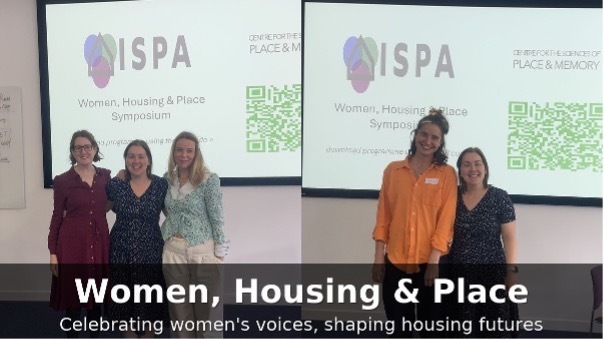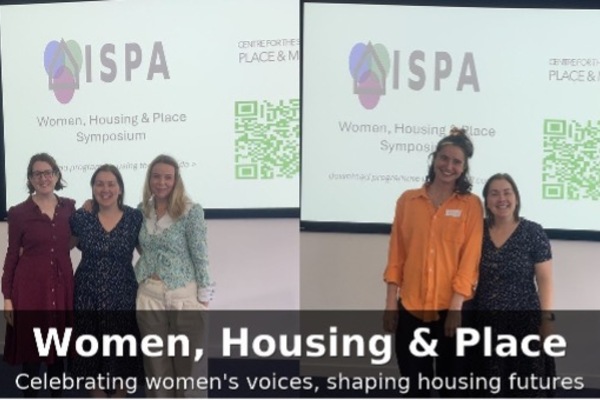
On Friday 12 September, the University of Stirling welcomed researchers, practitioners, and campaigners to campus for a one-day symposium on Women, Housing & Place. The free-to-attend event created a space for critical debate about how gender, housing and place intersect, and how policy and practice might better respond to these challenges.
Organised by Professor Kim McKee (University of Stirling), and Co-Hosts Dr Anna Pearce (University of Stirling), Dr Jenny Preece (University of Sheffield) and Dr Mhairi-Jean Ross (University of Glasgow), the symposium set out to foreground the intersectional experiences of women, focusing not only on their heightened risk of housing precarity, but also their leadership, mutual support and activism.
Themes of the Day
The symposium event proved to be an innovative day of knowledge exchange and relationship building for experts interested in the intersection of housing, place and gender inequalities. Several key themes emerged across the day. One recurring thread was the importance of adopting an intersectional lens when analysing housing issues. Presenters collectively considered issues around how gender intersects with class, race, migration status, and family structure to shape highly unequal experiences of housing security and access.
The value of historical perspectives was also strongly emphasised. We explored the development of housing policy over time, and the legacies it leaves behind, which help inform more equitable approaches today and alert us to the dangers of repeating past mistakes.
Another central theme was housing precarity, particularly its stigmatising impacts on marginalised groups. Lone parents, women escaping domestic abuse, and families with no recourse to public funds were identified as groups most exposed to housing vulnerability, with consequences that ripple across wellbeing, security, and social participation.
Finally, the symposium underscored the role of practice-based perspectives and women’s lived expertise. We discussed the centrality of incorporating these voices into both research and policymaking is vital if future approaches are to be inclusive, grounded, and effective.
Highlights
The symposium offered a rich programme of contributions. Professor Katherine Brickell (King’s College London) delivered a powerful keynote drawing on her recent book Debt Trap Nation: Family Homelessness in a Failing State. She highlighted the corrosive impact of debt on families, linking structural inequality with intimate struggles in the home. Her reflections resonated with Dr. Emma Bimpson (Sheffield Hallam University), who demonstrated how families’ attempts to rebuild a sense of home are often hindered by rigid housing and social work policies. Emma’s presentation really highlighted the tension between support and paternalism that women experience in interacting with vital, yet underfunded systems. Dr Tânia Casimiro (University of Stirling) brought a further international perspective to these debates through a spotlight on informal housing - capturing women’s spatial, material and architectural expressions on the outskirts of Lisbon, Portugal.
Historical perspectives also stood out. Professor Kim McKee, Dr Mhairi-Jean Ross, and Dr Valerie Wright (University of Edinburgh) explored the historical significance of women’s movements and housing development in the west of Scotland, showing how legacies of activism such as the birth of Scotland’s Community Controlled Housing Associations, the rise of networks of lone mother solidarity in peripheral housing estates and wider housing movements of housing activism, continue to shape the present. This session also illuminated how small-scale protest and organisation led by women is as worthy of attention as more spectacular mass mobilisations.
Equally powerful were contributions from Dr Satwat Rehman (One Parent Families Scotland), Hannah Brisbane (Engender), and Dr Natalia Farmer (Glasgow Caledonian University). The final panel discussion examined the successes and limitations of embedding gender-sensitive policymaking in Scotland, underlining the need for persistence in advancing women’s housing rights. They also reflected on the intersection of these gendered experiences with race, migration status and parenthood, as well as the need for greater attention to rural settings and the impacts on children themselves.
Dr Satwat Rehman, CEO of One Parent Families Scotland, shared her reflections on the issues raised during the day:
‘Attending the Women, Housing & Place symposium was both inspiring and sobering. The day powerfully illustrated how deeply gender intersects with housing insecurity, and how policy continues to fall short in addressing the lived realities of women, especially single mothers. What resonated most was the recognition that housing is not gender-neutral. Women’s unpaid care responsibilities, lower incomes, and vulnerability to discrimination mean they face unique barriers that demand specific policy responses. Yet too often, interventions are sticking plaster solutions, managing harm rather than tackling root causes. The symposium offered hope by showcasing the importance of women’s expertise—whether in research, activism, or lived experience—in shaping better housing policy […] By listening to women’s voices and investing in secure, affordable homes, we can move towards a fairer and more equitable housing system’
The symposium also provided funded travel and accommodation for some early career researchers to attend. Delegate, Lucia Crowther reflected on their experiences of the day:
‘I've been offered some fantastic opportunities through the IPSA project to attend extra-curricular events and conferences, and recently attended the Women, Housing & Place symposium. The variety of talks brilliantly showcased the range of approaches being taken to housing studies by academics from different disciplines, from archival research to oral histories and even detailed qualitative examinations of how current policy impacts families' experiences of the home in the present day. I think this can encourage junior researchers to think more broadly and ambitiously about the kinds of approaches and methods they can employ, and also to 'think big' about the impact that their research can have.’
Key Messages
Discussions on the day highlighted several urgent realities faced by women in housing systems. A key message was that mothers continue to experience acute pressures in navigating housing systems, with lone parents and women escaping domestic abuse facing some of the most significant challenges.
Speakers drew attention to the burden of debt, which compounds housing precarity and limits options for families trying to move forward. Alongside financial constraints, cultural perceptions of homeless mothers as moral failures perpetuate stigma, intensifying exclusion and undermining support.
Finally, the shortage of affordable social housing was recognised as a systemic issue that leaves many families in cycles of instability, unable to secure the safe, long-term housing they need.
Best Hopes and Next Steps
For many participants, this was the first time they had experienced an event exclusively comprised of women speakers. This was widely recognised as significant, offering a powerful demonstration of women’s expertise and leadership in housing scholarship and practice.
Closing discussions stressed the importance of centring women’s and girls’ voices in policymaking spaces. Too often, these perspectives are absent from the conversations that shape housing systems. The symposium reinforced the need not only to create platforms for these voices but also to ensure they actively shape future housing policy and practice.
The best hope moving forward is that the dialogues sparked on the day will lead to sustained collaborations, stronger solidarities, and tangible change. By embedding gender-sensitive approaches and amplifying lived expertise, the housing sector can move towards greater inclusivity and equity.
Final Thoughts
Conversations during the day also acknowledged the disproportionate labours of practical and emotional care that often prevent women from sharing research or attending conferences. The keynote session was delivered hybrid to open up the event to delegates for whom travel was difficult due to lack of funding and/or caring responsibilities.
The symposium was an important event in the housing calendar that not only recognized the dimensions of women’s struggles within housing systems but also celebrated the achievements of women’s housing movements throughout history.
Most importantly, it provided space to look forward, exploring new directions for collaboration and solidarity. In doing so, Women, Housing & Place demonstrated the power of bringing diverse voices together. They reaffirmed the urgent need to keep women’s housing experiences at the heart of future debates. We look forward very much to the fruits of new collaborations, research, and initiatives forged during this new forum for exploring gender-based housing evidence. Watch this space!
The hosting team are grateful to the Centre for the Sciences of Place & Memory and the Intersectional Stigma of Place-based Ageing project for their kind financial support, which made the symposium event possible. You can find more about their activities on their respective websites below. The ISPA project has an Early-Career Network for those with research interests that overlap with the project (stigma, place, ageing, disability):
https://www.housinglin.org.uk/Topics/browse/Design-building/InclusiveDesign/ISPA/







